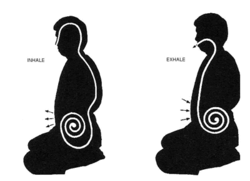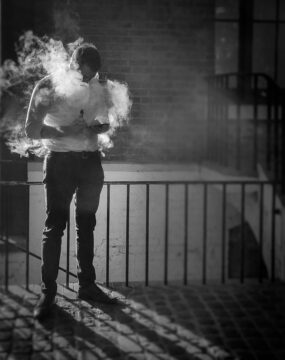by Ryan Sayre
Cigarette smoke, which fills a surprisingly large number of  establishments in Japan even today, is air folded many times over. Air folded into the folds of the lungs and folded back into the room with a curl. Smoke escapes from noses, mouths, and from ashtrays and it hangs in the room, giving density to common space. It folds the room into our bodies and affixes us to each other. In its ubiquity, smoke in Japan is nothing other than visible air and air, in turn, nothing other than invisible cigarette smoke, reaching into the folds of bodies and pulling them closer to one another.
establishments in Japan even today, is air folded many times over. Air folded into the folds of the lungs and folded back into the room with a curl. Smoke escapes from noses, mouths, and from ashtrays and it hangs in the room, giving density to common space. It folds the room into our bodies and affixes us to each other. In its ubiquity, smoke in Japan is nothing other than visible air and air, in turn, nothing other than invisible cigarette smoke, reaching into the folds of bodies and pulling them closer to one another.
To sit seza, (正座) is to sit with one's legs folded under the thighs. As the Chinese character suggests, it is to sit “correctly” (正). Despite all my studies in German, I can't say I ever learned the word or phrase to express “to have one's legs fall asleep.” In learning the Japanese language, which necessarily involves learning the Japanese uses of the body, the word shibireru and the concept it indexes find one early on in one’s studies. While the official Japanese dictionary defines shibireru as “losing sensation in part of, or in the entire body” or “to lose one's freedom of movement,” the sheer intensity and presence of pain brought on by 'correct' sitting in Japan quickly makes suspect any notion that shibireru operates under the sign of lack or loss. When a train goes into a dark tunnel, rather than robbing us of our vision, the panes of glass on either side of the lighted train car throw us back the dull reflected image of ourself straining to look outside. Perception is not lost but moved inward. Shibireru, I think, works on a similar perspectival shift. It is true that other than an intense non-localized dull pain, when our legs “fall asleep” we can't feel from them quite as we normally do. But this changes nothing of the fact that when we place our hands upon our thighs, however foreign or uncanny a feeling it may be, we can feel the two warm wedges of flesh and know them to be our own. Shibireru is not sensation's full departure but its distortion. It folds us tightly into the creases that hold apart self and other, feeling-person and felt-person.
I read somewhere, I no longer remember where, that the reason we can't tickle ourselves is that when someone else's fingers run across our bodies we suffer a stimulation overload as a result of not being able to distinguish between where we end and where the other begins. Insofar as this is true, and insofar as we agree that one can’t tickle oneself, is it then not reasonable to say that while Descartes might have proved the self's existence through an experiment of thought – I think therefore I am, the very existence of the other is proved undoubtably every time we are tickled by an Other? “tu me chatouilles donc tu es” “you tickle me therefore you are!” Maybe it is the bliss felt over the Other's proved existence every time we participate in the testing out of this little formula that accounts for why getting fixed in the folds between self and other should result in uncontrollable laughter rather than utter terror.


